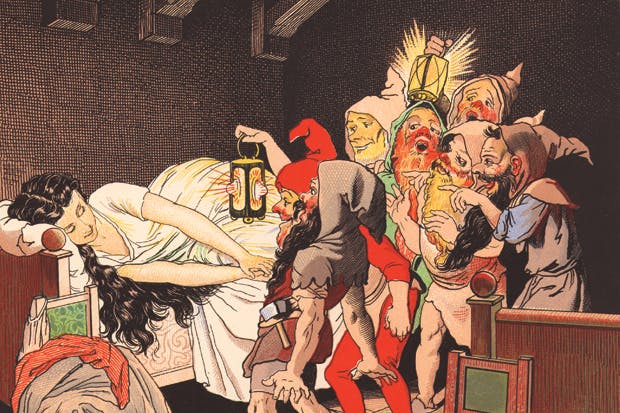‘Oh, I’m an owl,’ said my friend Nick. ‘You’re probably a lark.’ I raised an eyebrow. He explained. Apparently all human beings are either owls or larks, being genetically predisposed to stay up late or get up early, and to be at their best after sundown or dawn.
Nonsense, of course, complete nonsense. Nick just likes partying and his career does not demand his availability much before ten in the morning. The woman friend he had just consigned to the larks section of the human aviary has land and horses, needs to be up before dawn, and not unnaturally begins to flake out after about 9p.m.
None of this has anything to do with genes. Obviously the earlier you rise the earlier you feel like bed, the later you drift off the harder it is to get up early, and we settle into the rhythm and sleep patterns determined by our circumstances, by the pleasures that we seek, or by the willpower we lack.
Willpower (I’ll grant) might be influenced by genes; but it would be strange indeed if Darwinian selection had created two categories of human, the larks and the owls. In rural Africa, I pointed out to Nick, there are no electric lights and everybody goes to sleep around nine. They have to be up well before dawn, because of the heat that comes after sunrise; women have to fetch water, men to work in the cool. Are millions of rural Africans, then, natural owls, living wretched lives as their body clocks fight their circumstances? Or was Nick suggesting all Africans are larks?
But he was having none of my scepticism, and the reason was plain. The cheeky cigar, the midnight brandy, were because dear Nick was an owl, not because he was being self-indulgent. The disinclination to rise before ten was something he couldn’t help, he told himself: it was easier for larks.
Nick had read about owls and larks (‘Scientists say…’; ‘A new book explains…’) in a newspaper, and felt at once the theory’s persuasive force. As every pop psychologist or ‘A Doctor Writes’ medical correspondent knows, there are two surefire ways to hook in your readers and (if you write a book) pen a bestseller. Each can be summed up in a phrase. The first is ‘A little of what you fancy does you good’ and the other is ‘It isn’t your fault, you can’t help how you’re made’.
What links the two is evident. Both make the reader feel the pressure’s off. If a glass or two, or four, of red wine in the evening may be good for your heart — well, uncork another bottle. Your health! And if you turn into an alcoholic — well, maybe that’s because you’ve been born with an ‘addictive personality’, poor thing.
If you’re fat, don’t beat yourself up about it. It’s probably in your genes; or you’re in need of emotional reassurance; or you’re an endomorph (or whatever); or nature has given you more (or less) ‘brown fat’. Your body is trying to make you overweight, unlike those lucky people who can eat what they like and it doesn’t make any difference.
So you’re off the hook. Nature made you that way. We lap up the reassurance that this isn’t anything to do with self-indulgence — oh no, perish the thought. Books giving the patina of science to comfort like this fly off the shelves. Such newspaper features leap into the ‘most read’ category. Shakespeare may whisper, ‘The fault, dear Brutus, is not in our stars/ But in ourselves…’ but we hope experts will explain otherwise.
I shall now make a suggestion that I fear is guaranteed to enrage elements in the gay and lesbian community, so please be assured of what I am not saying. I don’t think the majority of gay men or lesbian women can ‘help’ their sexual orientation. I know I can’t and many, many gay friends would say the same.
But I do believe the imperative to insist that homosexuals ‘cannot help’ their sexuality has distracted modern thinking from the incidence of a numerous minority who can.
You may think you doubt it, but here’s a thought experiment to make you reconsider. Imagine we lived in a society where it was considered best to be homosexual; where gays were admired as perfect specimens of the species; where heterosexuals, though a majority, were called inferior and flawed, and made to feel ashamed; and where children were taught to see their ideal future in same-sex love.
Now ask yourself this. Do you honestly think that in such a culture, the number of people who thought of themselves as naturally gay would still be only about 5 or 6 per cent, as in the West today?
Of course not. Millions, aware that for them there was a choice, would have swung the other way. Likewise, in modern history the persuadable, seeing that the heterosexual persuasion was most advantageous, have taken an often unconscious choice, suppressing one side of their natures and opting to go with the grain of the other.
In my decades of campaigning for homosexual equality, I was never comfortable with the implicit whimper in ‘it isn’t our fault’. This was always the easiest way to sell reform: the 1957 Wolfenden Report keeps repeating that ‘inverts’ were the captives of their own bodies, advancing this as a reason why criminalisation was inappropriate. And ‘I am what I am’ became a gay anthem, with its hint that there could be no choice.
For many — I believe most — there never could. But for a substantial number, there has always been a choice. It should be self-affirming to say this; but we gays have never wanted to play into the hands of the religious right with their mumbo-jumbo about ‘curing’ homosexuality; so the quiet voice that suggests there are some who could change if they wanted is ignored.
I wish I could have chosen. I hope I’d have chosen to be what I am now. A thin gay lark.
Got something to add? Join the discussion and comment below.
Get 10 issues for just $10
Subscribe to The Spectator Australia today for the next 10 magazine issues, plus full online access, for just $10.















Comments
Don't miss out
Join the conversation with other Spectator Australia readers. Subscribe to leave a comment.
SUBSCRIBEAlready a subscriber? Log in